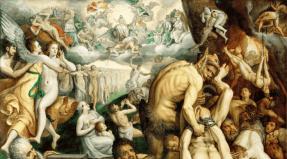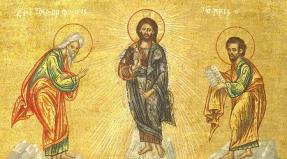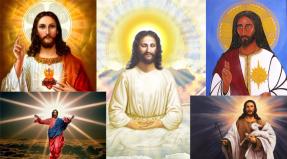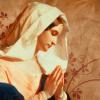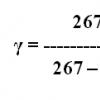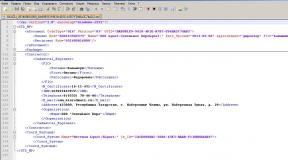What does Sabaoth really look like? Meaning of translation
). The name (feminine gender, plural) comes from the Semitic. root, to-ry occurs, for example, in Akkad. texts (- people, in many parts - soldiers, workers). In Heb. language means "army", "host". In the Septuagint it is transmitted in 3 ways: by transliteration Κύριος Σαβαωθ (most often in the Book of Isaiah); as Κύριος παντοκράτωρ - the Lord Almighty (the name is also transmitted); as Κύριος (or ὁ Θεὸς) τῶν δυνάμεων - Lord of forces (usually in the Psalms).

Heb. the syntax allows you to translate a phrase as a sentence without a verb (the Lord [is] Hosts), as a combination of a verb with an object (He Who creates armies; compare: Ps 32.6), as 2 nouns, one of which is an application (like Akkadian abstract noun feminine gender with -, conveying functions (Cazelles. 1985. Col. 1125); in this case the expression is translated as Lord Warrior), as an amplifying abstract noun in pl. h., denoting strength (from this understanding comes the Greek. The last, trad. the translation is based, among other things, on epigraphic evidence and Canaanite glosses in the Amarna letters. The "armies" were understood as the troops of Israel (cf. 1 Kings 17.45), heavenly beings (for example, 1 Kings 22.19-23; Ps.102.19-22; 148.1-5; Dan 8.10- 13), the council ("host") of the saints who surround God (cf. Psalm 81: 1; 88.8), or stars and other luminaries (cf: Deut 4:19; 4 Kings 23: 4-5) , as well as all terrestrial and heavenly beings (cf. Gen. 2. 1) (see in Art. The Heavenly Host).
The naming of "G. WITH." dates back to the pre-monarchic period of the Old Testament history. As a cult name, it is mentioned in the sanctuary () in Shiloh (1 Kings 1.3, 11), primarily in connection with the ark of the covenant (1 Kings 4.4). Since the existence of a sanctuary at this site can be traced back to the end of the Middle Bronze Age, some scholars suggest that the title could originally have been used in relation to the local Canaanite deities - Reshef, Baal, or El (Seow. 1992).

In Heb. In the text of the OT, the naming "Yahweh of hosts" (including the variants or,,) occurs 284 times (4 Kings 19.31 is not considered, since this is a correction (so-called Qere) of the Masoretes), and in 121 cases it is not title. Its distribution among the books of the OT is very characteristic. It is completely absent in the Pentateuch, in the books of Joshua and the Judges, and in the books written during the period of the Babylonian captivity (eg, in the prop. Ezekiel). In the books of Kings it occurs 15 times, while in Isa 1-39 it is used 56 (total in Is - 62), in Jeremiah - 82 (in the Masoretic version; in the Septuagint - 12), in the Psalms - 15, among the post-imprisoned prophets of Haggai - 14, Zechariah - 53, Malachi - 24 times. In the inter-testamental literature, it practically does not occur (in the Scrolls of the Dead m. Only once in 1QSb 4. 25).
These data make it possible to search for the connection of the name of G. S. with the divine service of the Jerusalem temple. The most typical example is its use in the composition of the song of the seraphim in the prop. Isaiah (Is.6.3; cf .: 6.5). GS is called "who lives on Mount Zion" (Is 8:18; cf. Zech 8. 3), and Jerusalem is His city (Is 47. 9), "sitting on cherubim" (1 Sam 4.4; 2 Samuel 6.2; 1 Chron 13.6; Isa 37.16). Such a cherubim throne was in the temple of Solomon (1 Kings 6: 23-28), and the ark of the covenant served as a footstool for God who was invisibly seated on this throne (1 Chron 28.2; cf. Ps 98.5; 131.7). This image is associated with the name of G.S. King (for example, Ps 23.10; Jer 46:18; 48.15; 51.57). In addition to omnipotence and royal power, the name of GS is associated with the creation of the world (Am 4.13; Jer 10. 16) and eschatological warfare (Is 13.4; 31.4). Isaiah's prophecy says that H.S. will reign in Zion (Isa.24.23) and make a meal there for all nations (Is.25.6). All nations will come to H.S. on the Feast of Tabernacles (Zech 14. 16-17) and bring gifts (Is 18.7).
In christ. tradition, the name G.S. is used in NT (Old Testament quotations in James 5.4 and Rom 9. 29) and in liturgical texts (see Sanctus). The Gnostics — the Sethians and Ophites — attached particular importance to it; it is also found in the texts from Nag Hammadi: "Hypostasis of the Archons", "Apocrypha of John", "On the origin of the world" (Fallon. 1978). In addition, Heb. and Greek. amulets and texts with magic spells containing this name. The connection of the name G. S. with the late Phrygian-Thracian cult of Sabazius is controversial (Johnson. 1978).
Lit .: Eissfeldt O. Jahwe Zebaoth // Miscellania Academica Berolinensia. B., 1950. Bd. 2. H. 2. S. 128-150; Fallon F. T. The Enthronement of Sabaoth: Jewish Elements in Gnostic Creation Myths. Leiden, 1978 (NHS; 10); Johnson S. E. Sabaoth / Sabazios: A Curiosity in Ancient Religion // Lexington Theol. Quarterly. 1978. Vol. 13. P. 97-103; Cazelles H. Sabaot // Dictionnaire de la Bible. Suppl. P., 1985. Vol. 10. Col. 1123-1127; Zobel H.-J. // ThWAT. 1989. Bd. 6. Sp. 876-892; Seow C. L. Hosts, Lord of // ABD. CD-ROM-Version.
A. A. Tkachenko
Iconography

In the Byzantine. art with the name G. S. is not associated with K.-L. iconography. Images accompanied by the inscription: "The Lord of hosts" appeared in Russian. art in the 16th century. The iconography is based on the image of Jesus Christ the Old Denmi: the Lord blessing with both hands, or with a scroll, with a power, less often with a book in his hand, in white clothes, the folds of the tunic are usually painted with pink paint, and the himation is green, the hair lies over the shoulders, Star halo, in the form of 2 intersecting rhombuses of blue and red colors (similar halos found in the image of the Angel-Sophia (for example, the figures accompanying the evangelists in the painting of the Church of the Assumption on Volotovo Pole near Novgorod (80s of the XIV century, destroyed), at the Tver royal gates (XIV century, Tretyakov Gallery), they call "Sophia").
One of the first examples of such iconography is presented in the icon "The Last Judgment" (16th century, Tretyakov Gallery): G. S. is depicted several times. once in each of the 4 compositions of the icon. On the 1st hallmark "And God rest on the seventh day" - sleeping on a bed, with a crucifix in his hands and in a crown (composition "Throne of Grace"), with a vessel in his hands (composition "Sending Christ into the world"); on the 2nd hallmark "The Only Begotten Son" - a half-length image in a medallion; on the third hallmark "In the tomb of the flesh" - G. S. with a scroll in his hands sits on the throne next to the risen Christ, sitting at the right hand, between Them the Holy Spirit in a star medallion (composition "New Testament Trinity", or "Holy See") ; on the 4th hallmark "Come, people" - GS on the cherub throne, in glory, with the symbols of the evangelists, with an open book in his hands. On the Last Judgment icon (mid-16th century, Tretyakov Gallery), GS is depicted on the throne twice: in heaven, surrounded by the forces of heaven and sending Christ to the Judgment, in both cases holding an unfolded scroll. The same image on the icon from Solvychegodsk (1580-1590, SIKHM). The image of G. S. was widely used in icons, murals and book miniatures. In the temple murals during this period, he took a special place - in the dome instead of the tradition. images of the Lord Almighty. The painting of the central dome of the Cathedrals of Arkhangelsk in the Moscow Kremlin (1564-1565), Assumption in Sviyazhsk (60s of the 16th century), Smolensk in the Moscow Novodevichy monastery (1598) presents the composition "Fatherland", where the image of G. S .corresponds to Old Denmi in Byzantine. iconography. In the compositions listed above, GS, like the Old Denmi, is associated with the first Hypostasis of the Holy Trinity.
The half-length image of GS is located in the southeast. the small dome of the Annunciation Cathedral of the Moscow Kremlin (after 1547), in the dome of the Trinity (now Pokrovskaya) tent-roofed church. Aleksandrovskaya Sloboda (70s of the 16th century), in the central dome of c. Holy Trinity in Vyazyami (late 16th century), in the conch of the deacon of the Cathedral of the Transfiguration of the Savior in Yaroslavl (1563).

Icons "Fatherland" with GS become the middle man of the forefather row of iconostases (for example, in the Smolensk Cathedral of the Novodevichy Monastery, the Assumption Cathedral of the Moscow Kremlin, the Trinity and the Assumption (the icon "The New Testament Trinity - Soprestolie") TSL cathedrals), and also in the form of small analogue images (icons of the 16th century, SPGIAKHMZ). Various versions of the image of GS in the heavenly segment, sitting on the throne or on cherubim, in the compositions "Fatherland" and "New Testament Trinity", or "Soprestol", are found in plural. icons: "Annunciation" (1558 and 1580-1590 - both in SIKHM; 1603, UGHG); The Nativity of the Virgin (early 17th century, State Museum of Fine Arts); "The Protection of the Virgin" (XVII century, SPGIAKHMZ); “The Descent of the Holy Spirit on the Apostles” (1682, Simon Ushakov, Trinity Cathedral of the TSL); "Resurrection - Descent into Hell" (40s of the 17th century, YAHM); "Meeting", "Baptism" (XIX century, private collection). Images of G. S. are included in complex compositions based on the texts of psalms and liturgical chants: "Our Lady of the Mountain of the Untamed" (end of the 16th century, SIKHM); "What shall we call Thee" (mid-17th century, TsMiAR); “I will regurgitate my heart, my word is good” (2nd half of the 16th century, TsMiAR); "Our Lady of the Impenetrable Door" (2nd half of the 17th century, State Russian Museum); "Sovereign Icon of the Mother of God" (19th century, church of the Kazan Icon of the Mother of God in Kolomenskoye), etc.
On miniatures of the 16th century, primarily in the Observatory of the Chronicle and Godunov's Psalms, GS is depicted in the "heavens" blessing, often with a power in his left hand. G. S. as the Creator of the world is represented in the scenes of "Creation" in the cycle "Genesis" in the painting of c. in the name of the Holy Trinity in Vyazyami, in churches in the name of St. Nicholas (Nikola Mokroi) in Yaroslavl (1673) and in honor of the Resurrection of Christ in the Rostov Kremlin (1675) and in Tutaev (1679-1680).
In the XVII-XVIII centuries. the image of GS is found in the murals of the Balkan temples: in the compositions "Fatherland" in c. vmch. George Polosh monastery (Macedonia, 1609), "Soprestolie" in the church of the monastery Dragomirna (Romania, 1607-1609).
The image of G. S. was banned at the Great Moscow Cathedral in 1666-1667. as inappropriate orthodoxy. doctrine, since, according to the conciliar definitions, it was an attempt to depict God the Father - the inimitable first Hypostasis of the Holy Trinity. However, despite the ban, the icons of the so-called. New Testament Trinity - "Fatherland" and "Soprestolie", the composition of which includes the image of G. S., continued to be created, were placed in the iconostases of central cathedrals (the Assumption Cathedral of the Moscow Kremlin), decorated the interiors of churches (Trinity Cathedral TSL). It should be noted that, despite the clear symbolic connection with the concept of the first Hypostasis, the inscription “God the Father” is not found next to such images.
Understanding the naming of “G. WITH." may coincide with the naming "Lord Almighty" ("Therefore, so says the Lord God of hosts, Almighty ..." - Am 5. 16) and refer to the Holy Trinity, and to God the Father, and to Jesus Christ, as in the inscription made around images of the Lord Almighty in the painting of c. Assumption of the Blessed. Theotokos on the Volotovo field near Novgorod: "Holy, holy, holy is the Lord of hosts, who filled heaven and earth with Thy glory ..." (see: Isa 6. 3; Matt 21. 9). The wide spread of the iconography of G. S. determined its correlation with Jesus Christ. The image of G. S., like the Old Denmi, could be accompanied by the inscription: IC XC (for example, on the miniature "Creation of Man" from the collection "Historical Paleya, Apocalypse with interpretation, presentation of the court cases of heretics Ivan Viskovaty and Matvey Bashkin", 2nd quarter of the 17th century, IRLI (PD). Old sheet, sheet 23). On the engravings of the Bible by Vasily Koren (1692-1696), in the scenes "Creation of the World", the Creator presents an Angel with a star-shaped halo, the inscription: "The Lord of hosts." Thus, the image of GS belongs to such symbolic images as the Old Denmi, the Angel of the Great Council, Sophia the Wisdom of God, which are based on various texts of the OT and are widely represented in the Byzantine period. and Old Russian. art.
Lit .: Gerstinger H. Ueber Herkunft und Entwicklung der anthropomorphen byzant.-slav. Trinitätsdarstellung des sogenannten Syntronoi und Paternitas Typus // FS W. Sas-Zaloziesky zum 60. Geburtstag. Graz 1956; Retkovskaya L. WITH . On the emergence and development of the composition "Fatherland" in Russian. art // Drevnerus. art XV - early. XVI century M., 1963.S. 235-262; Onasch K. Ketzergeschichtliche Zusammenhänge bei der Entstehung des anthropomorphen Dreieinigkeitsbildes der byzant.-slav. Orthodoxie // Bsl. 1970 T. 31. No. 2. S. 229-243; Uspensky L. BUT . Theology of the icon of the Orthodox Church. P., 1989.S. 315-352; Icons from private collections: Rus. icon painting XIV - early. XX century: Cat. vyst. M., 2004. No. 87, 89.
N. V. Kvlividze
To the question in the Synodal translation many times hosts hosts, what is the translation and meaning from the Hebrew? given by the author Vasily Ushakov the best answer is The name "SABAOF" (Ex. 47: 4; 10:16; Am. 4:13; 5:27) reveals God as omnipotent over all powers, it is well shown in the book of Revelation. How many names does God have? In the Old Testament, God was revealed by many names: the names "EL" and "ELOHIM" ("God"), reveals the power inherent in God. They represent Him as Strong and Mighty, as God who created everything (Gen. 1: 1; Ex. 20: 2; Dan. 9: 4). The names "ELION" ("Most High") and "EL ELION" ("God Most High") indicate His exalted position (Gen. 14: 18-20; Is. 14:14). The name "ADONAI" ("Sovereign Lord") speaks of God as the Almighty Sovereign (Isa. 6: 1; Ps. 34:23). These names emphasize the majestic and extraordinary character of God. Other names reveal God's desire to have fellowship with people. The names "SHADAI" ("Almighty") and "EL SHADAI" ("God Almighty") represent the Almighty God who is the source of blessing and comfort (Ex. 6: 3; Ps. 90: 1).
The name "YHVH" (YHWH is a supposed transliteration of the holy name of God used in the Old Testament (Ex. 3: 14,15; 6: 3). The original Hebrew word consisted of four consonants YHVH. Over time, fearing to defile the name of God, the Jews refused to read it aloud, wherever YHVH was found, they read this word ADONAI, and in the seventh or eighth century AD, when vowels were added to Hebrew words, the Massorets added the vowels of Adonai to the consonants of YHVH. JEHOVAH, which is used in the English Bible translation of King James. Other translations prefer the word Yahweh (Jerusalem Bible) or Lord (RSV, NIV, NKJV)). The name "Jehovah" or "Lord" testifies to the faithfulness of the covenant on the part of God and His mercy (Ex. 15: 2,3; Hos. 12: 5,6). In the 3rd chapter of the book of Exodus in the 14th verse, Yahweh calls Himself "I AM THAT" or "I WILL BE the same," indicates His unchanging attitude towards His people. Sometimes God revealed himself even more closely as "FATHER" (Deut. 32: 6; Isa. 63:16; Jer. 31: 9). With the exception of the name "FATHER", the names of God in the New Testament are equivalent in meaning to His names in the Old Testament. In the New Testament, Jesus calls God "Father" to bring us into closer and more personal fellowship with Him (Matthew 6: 9; Mark 14:36; cf. Rom. 8:15; Gal. 4: 6)
Answer from 22 answers[guru]
Hey! Here is a selection of topics with answers to your question: In the Synodal translation there is a host of hosts many times, what is the translation and meaning from the Hebrew?
Answer from Worldview[guru]
The biblical expression יהוה צבאות Adonai tsvaot “God of armies” is rendered in Russian as “God of hosts”. Remember, in the excellent book of the Strugatsky brothers "Monday begins on Saturday" appears "the former leading magician of the globe", and now "the head of the Department of Technical Service" at the Institute NIICHAVO Savaof Baalovich Odin. He received his name from the Bible, his patronymic - by the name of the main god of the Phoenician pantheon (Baal, he is Baal; in Hebrew בעל baal “husband, master”), and his surname - by the name of the Scandinavian god (Odin or Wodan). Another name of the Phoenician god is known to us as Moloch - akin to the Hebrew מלך melech “king”.
Answer from Suck[guru]
Warrior, or general.
Answer from Anatoly Muzafarov[guru]
"The expression" Lord (Yahweh) of hosts "is an untranslated Hebrew title for God. books of the Bible from Genesis to the Book of Ruth, but is found in the books of Kings, in the books of Chronicles, in the Psalms and in the books of the prophets. , the guess about the armies of angels is correct. This name emphasizes the universal power of God, in whose hands are the destinies of the world "
Having seen the image of "Lord of hosts" in our gallery, I decided to find out in more detail what this name means.
The name "Lord of hosts" is mentioned in the Bible many times. And this name means something. The name "Lord of hosts" did not disappear with the departure of the Old and the coming of the New Testament. Just as in the Old Testament people believed in this great one Lord, so it is in the New Testament. The Lord does not change, and the Bible says that He will remain the same yesterday, today, and forever.
We cannot say that in the Old Testament people believed in the Lord Jehovah and believed that He is the Lord of hosts (which from the Hebrew language means "Lord of armies"), but today we believe in another Lord. No! We believe in the same God in whom the people of the Old Testament believed, and we live according to the same commandments.
But today you and I have more than them. Today we have mercy from the Lord, mercy to receive forgiveness when we sin. They didn't have that. Each sin was followed by a specific penalty.
How is the Old Testament different from the New? The New Testament is a covenant of mercy, but none of the commandments, none of the names of God that we read about in the Old Testament, are crossed out. The truth is not deleted, but even more is revealed. From faith to faith and from glory to glory. The New Testament has revealed to us the great glory of truth. He showed that the Lord is also merciful. As the Bible says: "For God so loved the world that He gave His only begotten Son, so that everyone who believes in Him should not perish, but have eternal life." This is what the New Testament is made of.
"For God so loved the world ..." Which God loved the world? - The same one in which people believed in the days of the Old Testament. Another quality of His was revealed - mercy. And now it is not necessary to endure the punishment for sins if you repent of them. If you confess, if you accept the sacrifice of Jesus Christ, which He took up in His body on the cross. He paid with His blood. And if you believe in this today, then you receive mercy from God.
According to the Old Testament, if you have sinned, then nothing will save you, whether you believe it or not. As it is written: "The soul of sin, it will die." Here is the Old Testament.
Today we are talking about such a name of the Lord as the Lord of hosts (Hebrew "tsevaot" from the word "tsava" - army). And I would like to start by saying that today very many Christians do not understand what the Church is. Many Christians, perhaps, mistakenly think that the Church is a quiet haven, a peaceful and calm life day after day. They think that the Church is when you have to be in a state of "inhibited stupidity."
This is not Christianity, this is Buddhism, this is some kind of nirvana. If we take Hinduism, then this is a tangle of problems; if you take Buddhism, then this is sheer nirvana. Those. when you become a Buddhist, you become a "hindrance". And you believe that the more inhibited you are, the better you are.
How is Christianity different from Islam? Islam is a perverted, extreme form of Judaism: if you are unfaithful, then you must be destroyed, you cannot live on earth.
What is Christianity? Christianity is a religion that makes a person a person, makes a king a king, who puts everything in its place. This is Christianity.
If a person is an alcoholic, then Hinduism tells him that such is his karma. Save him, don't save him - he is an alcoholic and an alcoholic will die. Christianity says: no, you need to put everything in its place. You were born a human, so get forgiveness from the Lord, become free and be a Human. Islam says that if you are an alcoholic, then you must be killed. Christianity puts everything in its place.
If a king is a Christian, then this is the wisest king. If an official is a Christian, then this is the wisest official. If a businessman is a Christian, then he is the most successful businessman. If a person is a Christian, then this is the most humane person. Christianity gives you the opportunity to be who you were born.
It so happens that a person, coming to the Church, calms down and begins to dwell in something like nirvana. And when the Church of God is faced with war, they are unable to fight, because they have a wrong idea of Christianity.
Buddhism is incapable of fighting because it is the religion of nirvana. On the contrary, Muslims can only fight. Christians, when it is necessary to be in the world, can be in the world, but when it comes to war, then these are the best warriors. Amen.
Today we will talk about what the Church is and who the Lord of hosts is in our lives.
When the Lord Jesus Christ said: "I will create My Church, and the gates of hell will not prevail against it," He spoke in the future tense. What does it mean? Nothing less than the fact that the Church must constantly be ready for war. The church is not the place of nirvana. There are days when the Church must defend the "Holy Land" on which she stands.
We must not only believe in heaven, in commandments, in truth, in the Lord Jesus Christ. We also need to be able to uphold these beliefs. You need to be able to defend your family, your friends, your God and your Church. Those. there are holy laws that must not be violated. If you get married, then you cannot divorce. If you have friends, then you cannot break off relations with them if they do not leave you. If you have believed in the Lord, then you cannot suddenly say that you no longer believe in Him. And in the same way, if you are in some church, then you cannot say: "Today I no longer want to be in this church."
We must defend these four laws. It takes courage, jealousy, wisdom, and strength to stand up for what we believe in.
You know that the name of the Lord of hosts is not mentioned before the books of Kings. Let's open the First Book of Kingdoms and read about David. David knew better than many of us what the Church was. While he was a shepherd, he could suddenly become a warrior at the right time. When he was in the world, he was the greatest poet. When he was king, he was the greatest king that could be.
He did not limit the Lord to just being a good poet. When the Philistines advanced, he laid down his harp, took his sword, equipped his army and won. When it was necessary to conduct political affairs, he did them like no one else. When it was necessary to graze sheep, he grazed them as the best, as the most professional shepherd.
And Samuel said to Saul: The Lord has sent me to anoint you as king over His people, over Israel; now listen to the voice of the Lord. Thus says the Lord of hosts: I remembered what Amalek had done to Israel, how he opposed him on the way, when he was going out of Egypt; now go and smite Amalek [and Jerim] and destroy all that he has; [do not take anything from them, but destroy and curse everything that he has;] and give him no mercy, but put him to death, from husband to wife, from boy to suckling baby, from ox to sheep, from camel to donkey ( 1 Sam. 15: 1-3).
When the prophet on behalf of the Lord of hosts appeared to the man who was to lead Israel, he walked and said: "I have come to you on behalf of the Lord of War, and I want you to deal with the enemies of Israel." We know that Israel is the Old Testament image of the Church today. Various things happened in Israel, and it happened that they had to wage a war.
We recall the story when Israel fought with the Philistines: Goliath went out and reviled the holy people, frightening the entire Israeli army. At that time, the little shepherd boy David came to the camp to deliver food to his relatives. Seeing how this uncircumcised pagan, or how it would sound today - this sinful man who is not a Christian, who is not a holy person, reviled God's people, came out and said a very amazing thing: "You are going against me with a sword, a spear and shield, and I go against you in the name of the Lord of hosts, the God of the armies of Israel. "
Who told this little shepherd boy that the Lord is the God of hosts? Love for the Lord gave him a certain knowledge. David lived a spiritual life. If we live a spiritual life, then we have knowledge from the Lord, we cannot be deceived, we cannot be deceived, confused. If you pray every day, if you read the Bible every day, then the Lord puts forth the right thoughts through all this.
From the physical side, nothing shone to David, except for defeat. But there was no desire in his heart to leave. Because he knew that it was not the Israelites who started the war, but the Philistines; Israel did not take the youths and girls of the Philistine villages as slaves, but the Philistines. In that battle, it was necessary to decide everything, it was necessary to stop the enemy.
What happened? David went out and the Lord was with him. He went and won. Not because he was super-great, but because he was under the influence of the Spirit of the Lord of hosts.
Elijah is one of the great prophets in Israel. At that time a man reigned over Israel, who took a Gentile woman as his wife. She began to influence the king and, in the literal sense of the word, forced all Israel to worship pagan gods.
It was a war. It was spiritual warfare.
Hearing this, Elijah covered his face with his mantle, and went out, and stood at the entrance to the cave. And a voice came to him and said to him: Why are you here, Elijah? He said: I am jealous for the Lord God of hosts, for the children of Israel have forsaken Thy covenant, they have destroyed Thy altars, and killed Thy prophets with the sword. I was left alone, but they are looking for my soul in order to take it away (1 Kings 19: 13,14).
Look, Elijah began to talk with the Lord as with the God of armies when this spiritual war took place in Israel.
The Church also today has a physical war against slander, filth, swindlers, etc. The Church also has a spiritual part of war, and each of these areas must be led by a certain person.
The king cannot wage a spiritual war, he does not quite understand how it is done. Likewise, a prophet cannot wage a physical war.
Look what Elijah said: "Hearing this, Elijah covered his face with his mantle, and went out, and stood at the entrance to the cave. And there was a voice to him and said to him: Why are you here, Elijah? He said: I was jealous of the Lord God. Savaofe ... "Ie. it's time to start a war, it's time to free the spiritual field of Israel from these pagan temples.
"For the children of Israel have forsaken Thy covenant, they have destroyed Thy altars and killed Thy prophets with the sword ..." It is time for a man who has spiritual authority to enter the arena.
How did Elijah win this war? He gathered all the people of Israel and addressed them with a speech: "You have believed all your life in the Lord Jehovah, but now you have become slaves of paganism." As Elijah spoke, a spirit awakened in their hearts, which was lulled to sleep by pagan delusions. His final words were: "Listen: if Baal is God, then let's serve him. But if our Lord is God, then let's return to Him."
We know that the priests of Baal made an altar to their god, and Elijah made an altar to the Lord out of twelve rough stones. The priests of Baal laid a sacrifice and danced, raged, stabbed themselves with knives, begging that their god would light this altar. But nothing happened.
Then Elijah began to laugh at them. This holy man of God began, in the literal sense of the word, to scoff. All methods are justified when the Lord is with you. If you literally translate what he said, then this does not fit into any framework: "Maybe your god went to the toilet?" Well, that's to say the least.
And people watched, perhaps thinking, "Who is this disrespectful person?" But Elijah knew what he was doing. His methods were justified.
Finally he said: "Okay, finish," ordered to pour water on the altar of the Lord, prayed to God, fire came down from heaven, and the sacrifice was kindled. At that moment, the spirit in people was resurrected. It was a spiritual victory for God's spiritual authority. Exactly the same as the victory of little shepherd David over Goliath.
During the time of Elisha, Israel also experienced a spiritual crisis. Jehoshaphat, who was king over Israel at that time, was to defeat one of the strongest pagan armies. He was a very wise man and therefore turned to the prophet of God, sending people to him with the question to wage war on the king or not.
And Elisha said: As the Lord of hosts lives, before whom I stand! If I had not venerated Jehoshaphat king of Judah, I would not have looked at you and would not have seen you; now call me a guslist. And when the harp played on the harp, then the hand of the Lord touched Elisha, and he said: This is what the Lord says: make ditches behind the ditches in this valley ... (2 Kings 3: 14-16)
The prophet of God gave the king certain directions on how to overcome. And after Jehoshaphat with his army did as Elisha said, the pagan army was defeated. God was with them.
For the day of the Lord of hosts is coming for everything that is proud and arrogant, and for everything that is exalted - and it will be humiliated (Isa. 2:12).
When the "proud", "arrogant" and "exalted" rise up against the Church, then in order to humiliate this, the Church must fight. This will be the fulfillment of the will of God. And we, as spiritual people, must desire with all our hearts that the will of God be fulfilled.
Therefore, when the "proud", "arrogant" and "exalted" rise up against the Church, and the Church does not oppose this, it is a violation of God's commandment. Why was Israel in fear when Goliath went out and reviled them? Yes, because the soldiers who were supposed to fight were not fulfilling their task.
Why was Israel swallowed up in pagan religion during the time of Elijah? Because the people who were supposed to wage a spiritual war, defeat the deception, and did not lift a finger to do it. It is a sin.
What is behind the name of the Lord of hosts?
For the day of the Lord of hosts is coming for everything that is proud and arrogant and for everything that is exalted - and it will be humiliated - and on all the cedars of Lebanon, high and exalted, and on all the oaks of Bashan, and on all the high mountains, and on all the towering hills, and on every high tower, and on every strong wall, and on all the ships of Tarshish, and on all their longed-for adornments. And the greatness of mankind will fall, and the lofty mankind will be humiliated; and the Lord alone will be high on that day (Isa. 2: 12-17).
This is the aura that surrounds the name of the Lord of hosts, in Whom we believe. We must remember this title of God when we are at the stage of hostilities. Whether it is a spiritual war, when deception creeps into the Church, or a physical war, when there are terrorist acts against churches or some kind of courts ...
At this point, we must believe in our Lord as the God of war. We cannot just stand like those soldiers and watch Goliath vilify God's people.
We need to know the character of our God.
The Bible said, "Don't avenge yourself." If you have been offended, then you must not avenge yourself. But when it comes to the "Holy Land", then if you are silent, you are sinning.
You act mercifully with the merciful, with the sincere husband - sincerely, with the pure - purely, and with the evil one - according to his craftiness (Psalm 17: 26,27).
This is the character of the Lord. If you are sincere, if you are pure, then the Lord does the same with you. But if you begin to cunning against the Lord, against God's Church, then get ready for such cunning that you cannot even invent.
If you are the son of your Father, you must take the character of God into your spirit. You must love the sincere, you must be sincere with the sincere, with the pure be pure. But with the evil one you should not be pure, with the evil one you must not be sincere. With the evil one you must act "according to his craftiness."
The Passover of the Jews was approaching, and Jesus came to Jerusalem and found that in the temple they were selling oxen, sheep and doves, and the money changers were sitting. And making a whip of cords, he drove out of the temple all, also the sheep and the oxen; And he poured out the money of the money changers, and overthrew the tables. And he said to them that sold doves: Take this from here, and do not make my Father's house a house of commerce. At this, His disciples remembered that it is written: Zeal for Thy house is eating me up (John 2: 13-17).
In this episode, no one offended the Lord Jesus personally. He just entered the Temple, the Holy Land. But what He saw there shocked Him. He did not stay alone, but made a whip of ropes, drove everyone out, turned the tables over, and scattered the money from the money changers.
It looked unsightly. The Lord's disciples took it right. This is what distinguishes students from those who are just around. The Lord's disciples understand His character. Someone asked Jesus: "What sign will you prove to us that you have the authority to do this? Why are you acting like a bandit?" None of the students asked this. But they remembered the words of Scripture that said about Jesus: "Zeal for your house is eating me up."
What did the apostles do?
I teach you, my son Timothy, in accordance with the prophecies about you, such a testament that you should fight in accordance with them, like a good warrior (1 Tim. 1:18).
The Apostle Paul commanded Timothy to be a soldier.
Having faith and a good conscience, which some have rejected, shipwrecked in faith; such are Hymenaeus and Alexander, whom I gave to Satan so that they might learn not to blaspheme (1 Tim. 1: 19,20).
What does it mean? This is both defense and attack. Satan means adversary. In other words, the Apostle Paul warned them: "If you do not calm down, then you will be occupied by people who will resist you so much that it will not seem like a little."
I ask that after my coming I do not resort to that firm courage, which I think to use against some who think of us that we are walking in the flesh (2 Cor. 10: 2).
The apostles were accused of walking in the flesh. Maybe this is related to Imenaeus and Alexander?
For we, walking in the flesh, do not fight according to the flesh (2 Cor. 10: 3).
He says: "We are not defending ourselves."
The weapons of our warfare are not fleshly, but powerful by God for the destruction of strongholds: with them we subvert the designs and all exaltation that rebel against the knowledge of God, and we captivate every thought into obedience to Christ, and are ready to punish all disobedience when your obedience is fulfilled (2 Cor. 10: 4- 6).
"The weapons of our warfare are not fleshly"; not like the bandits. But God has power - it's His law. And the secular law is also the power of God.
Lord of hosts - our God has such a name. If it is necessary to fight, Jehovah suddenly becomes Sabaoth. If you need to forgive, hosts of hosts becomes an all-merciful God and gives His Son Jesus Christ to the cross for each of us. God cannot be limited.
The only thing that stops Him is when division comes to His people, when there is ignorance in His people. Ignorance is fatal. And we must know what we are doing, we must know. And we get knowledge from the Bible.
Perm wooden sculpture - Lord of hosts: 
Lord of hosts
(Hebrew "Lord of hosts")
one of the names of God in the Holy Scriptures. The "armies" were understood as the troops of Israel (cf .: 1 Kings 17:45), heavenly beings (for example, 1 Kings 22, 19-23; Ps. 102, 19-22; 148, 1-5; Dan. 8 10-13), the council ("host") of saints surrounding God (cf. Ps. 81: 1; 88, 8), or stars and other luminaries (cf .: Deut. 4:19; 2 Kings 23 , 4-5), as well as all earthly and heavenly beings (cf. Gen. 2, 1) (see the Heavenly Host).
Unlike other names for God, the name of Hosts emphasizes the property of omnipotence, borrowed from the army. This name is not found in the oldest books of the Bible, but it is often used by the prophets and in the psalms. The Lord of hosts is called "who dwells on Mount Zion" (see Isa. 8:18; cf. Zech. 8, 3), and Jerusalem is called His city (see Isa. 47, 9), "sitting on cherubim" (see 1 Sam. 4, 4; 2 Sam. 6, 2; 1 Chron. 13: 6; Isa. 37, 16). Such a cherubim throne was in Solomon's temple (see 1 Kings 6: 23-28), and the ark of the covenant served as a footboard for God who was invisibly seated on this throne (see 1 Chron. 28, 2; cf. Ps. 98, 5; 131, 7). This image is associated with the name of the Lord of hosts King (for example, Ps. 23, 10; Jer. 46, 18; 48, 15; 51, 57). In addition to omnipotence and kingship, this name is associated with the creation of the world (see Am. 4:13; Jer. 10:16) and eschatological warfare (see Isa. 13, 4; 31, 4). Isaiah's prophecy says that the Lord of hosts will reign in Zion (Isa. 24, 23) and make a meal there for all nations (see Isa. 25, 6). All nations will come to Him on the Feast of Tabernacles (see Zech. 14: 16-17) and bring gifts (see Isa. 18: 7).
In the Christian tradition, the name of the Lord of hosts is used in the New Testament (Old Testament quotes in James 5, 4 and Rom. 9, 29) and in liturgical texts. The understanding of this naming may coincide with the epithet Lord Almighty (Therefore, says the Lord God of hosts, Almighty ... - Am. 5:16) and refer to the Holy Trinity, and to God the Father, and to Jesus Christ.
Orthodoxy. Reference dictionary. 2014 .
See what "Lord of hosts" is in other dictionaries:
Lord of hosts- The Lord of hosts, the Lord of hosts, the Lord of armies, the Hebrew word, often found in c. h. (Ps.58: 6, Is.5: 7. Jer. 2:19, etc.) and only twice in N.Z. (Rom. 9:29, James 5: 4). The word of hosts, i.e. The Lord of armies, according to some, refers to God ... Bible. Old and New Testaments. Synodal translation. Biblical encyclopedia of arch. Nicephorus.
LORD SABAOTH- [Heb. ; ], one of the names of God in the Holy. Scripture (about the name Yahweh of hosts, see v. God). The name (feminine gender, plural) comes from the Semitic. root, which is found, for example, in Akkad. texts (people, in many cases, soldiers, workers). In Heb. language ... Orthodox encyclopedia
Hosts of hosts- (צבאות Tsevaot) ... Wikipedia
LORD POTENTIOR- Lord Almighty. Obverse of the solid. 685 695 (Cabinet of medals of the National Library, Paris) Lord Almighty. Obverse of the solid. 685 695 (Cabinet of medals of the National Library, Paris) [Greek. Κύριος παντοκράτωρ], one of the names of God in the Holy. ... ... Orthodox encyclopedia
SAVAOF- (Hebrew Tsebaot), a word used in the OT together with priest. * In the Name of God (* Tetragram, or Tetragrammaton). Is plural. number from the tsaba, the host. Therefore, the phrase "Lord of hosts" (Hebrew Yahweh Tsebaot) can be translated as "Lord, ... ... Bibliological dictionary
Hosts of hosts- (from the Jewish force, the army) one of the biblical names for God. Unlike other names for God, such as Elohim, Jehovah, Adonai, S. especially puts forward the property of omnipotence, the image of which is borrowed from the army. This name is not found in ... ... Encyclopedic Dictionary of F.A. Brockhaus and I.A. Efron
- (Hebrew Zebaoth strength, armies). Old Testament name for God. Dictionary of foreign words included in the Russian language. Chudinov A.N., 1910. SAVAOF Heb. zebaoth, from zaba, army, army. Lord of forces. An explanation of the 25,000 foreign words included ... ... Dictionary of foreign words of the Russian language
The image of the Almighty Father is considered unique and has been known since ancient times. More often on the icons, the Sabaoth appears as a gray-haired old man on a throne, in His eyes great wisdom and tranquility are read. The face of the Lord the Father in the images is placed in a symbolic triangle, which tells Orthodox believers about the presence of the Holy Trinity, which originates from the Almighty and One God himself.
Before the icon of Sabaoth, they ask for the forgiveness of vicious sins, for giving strength to perform beneficent deeds that cleanse the heart and environment.
Historical reference
Hosts - one of the names of the Most High God, mentioned in the Scriptures, is of Jewish origin and translated means "the army" (that is, the Lord who created the army).
God of hosts. Painting by V.M. Vasnetsova
The armies of the Creator mean:
- defenders of Israeli lands;
- heavenly servants of God;
- the host of saints surrounding Him;
- stars and other similar objects in space.
The phrase "Lord of hosts" took root back in the Old Testament period. As a cult name, it was used in the shrines of the Hebrew city of Shiloh and was associated with the Christian Ark of the Covenant.
Description of the icon
In Byzantium, images of the Most High Father were not created or used; in the Russian iconographic tradition, the image appeared in the 16th century. The creation was based on the face of the Savior of the Old Denmi (Incarnation of the Eternal Son). The Lord blesses his own people with both hands or holds a scroll or book. His clothes are snow-white, the folds of his tunic are filled with pink shades, the himation (cape) is green, his hair evenly spreads over his shoulders. The halo has a star-like shape, made up of the intersection of two rhombuses.
 Icon of the Lord of hosts
Icon of the Lord of hosts
For the first time the image appeared on the icon under the name "The Last Judgment". Father of hosts is shown several times in each of the four compositions of this canvas.
- On the first brand - God is resting on the bed after the creation of the world, in His hands is a crucifix and a vessel (a symbol of sending the Son as a sacrifice), on his head is a crown.
- On the second composition, the Lord of hosts is depicted up to the waist and in a medallion.
- On the third - He sits on a throne and holds a scroll, next to the right is the resurrected Christ, and between Them is the Holy Spirit crowning the Trinity.
- The fourth brand, “Come, people,” demonstrates God sitting on the cherubic throne, shining with glory and with the Holy Scripture revealed in his right hands.
- The image of the God of hosts was widely used in writing icons, creating literary miniatures and murals. In Russian churches of the 16th century, the image of the Lord the Father was often placed on the inside of the main dome. The murals could be seen in the cathedrals of the Moscow Kremlin, the church in Vyazyomy (Odintsovo), as well as in the Yaroslavl monastery.
It must be remembered: the icon is a kind of reference point for those who have not yet cleared their minds of sinfulness. The saints see God with their inner light, also beyond description.
History of iconography
The Orthodox images of the Father of hosts in the composition entitled "Fatherland" directly corresponded to the face of the Old Denmi (Incarnation of the Eternal Son) used in Byzantine culture. A similar style was used in wall paintings and as analogion faces.
Other versions of the image of the Lord in various guises are found in the compositions of many icons, such as: "Annunciation", "Nativity of the Mother of God", "Protection of the Virgin", "Descent of the Holy Spirit on the disciples of Christ", "Sovereign" icon of the Most Pure Virgin, etc. ...
- In miniatures created in the 16th century, He is shown as being in the heavenly spheres and blessing humanity. In His left hand is the orb, as in the scene called "Creation."
- In the period from the 17th to the 18th centuries. The Lord the Father appears in the murals of churches in the Balkan region. The composition "Fatherland" finds its place in the monasteries of Macedonia and Romania.
 Icon "Fatherland"
Icon "Fatherland"
- At the Moscow Cathedral, held in 1667, the image of the Most High Father was forbidden to be used on icons, shorthand and miniatures. The law was based on the opinion that this image does not correspond to the canons of the Orthodox faith, since God - the First Hypostasis of the Holy Trinity - cannot be presented and portrayed in its true light.
- However, the ban did not become an obstacle to the continued creation of the most significant compositions ("Fatherland" and "Soprestolie"). They were placed on the inner sides of the main domes and other parts of churches. Despite the easily visible symbolic connection between the Lord of hosts and the first Hypostasis of the Trinity, the name “God the Father” was not written under the icons. The wide distribution of these images in Russia is due to their correlation with the faces of Jesus.
Prayers to God the Father
In Russia, a prayer request addressed directly to the first Hypostasis was of great importance. Since ancient times, the akathist, which is in the structure of certain solemn prayers, has been read during church services.
There is a slight difference from the generally accepted texts: the word “Rejoice”, traditionally ending ikos, has been replaced by “Lord God”. The hosts here are called the Leader of the Heavenly Armies, and the akathist himself is saturated with an atmosphere of deep reverence for the Creator. Therefore, the phrase "have mercy on me!" sounds like a legitimate appeal of a created being to its Creator.
Prayer to God the Father Lord of hosts
Oh, Almighty Sovereign King! Sit on the clouds, resting in the Highest, who is Blessed in the firmament of heaven. Holy, Holy, Holy is the Lord of hosts, fill heaven and earth with Thy glory! Hosanna in Vyshnykh! Fulfill, O God to the Almighty, this humble prayer and petition of your servant, may your ears be listening to the voice of our prayers, holy Lord! Mercifully look and hear us, Thy servants from earth to heaven crying to Thee: save, save and have mercy on us, deliver us from all troubles and misfortunes and all evil, protect us with the Holy Spirit in days and nights and for every hour, give me victory and everyone, You. to those who pray, Your Divine Power, Miraculous Grace, full strength and strength. By the power of the Honest and Life-giving Cross of the Lord, defeat all our enemies, visible and invisible, create them like sheep, and scatter them like dust in the face of the wind, so that they may know Your name, Lord, let them be ashamed forever, as you are the Most High throughout the earth and bear a cold to those who trust in Thee for ever and ever. Amen.
Upon careful reading of the prayer text, God the Father sees the presentation of the Christian doctrine of the Holy Trinity. In a succinct but precise form, the akathist reveals the main events in the history of the Church from the days of creation to the all-merciful sacrifice of Christ. Such a characteristic, coupled with a highly artistic style of building and transmitting information, elevates a prayer appeal to the Lord to the rank of the greatest works of hymnography.
On canvases, the Lord often appears as a wise gray-haired old man, symbolizing the first face of the Trinity. The icons of God the Father gained their distribution since the 16th century, believers turn to them in order to receive deliverance from sinfulness.
Despite the theological prohibition of using the image of Sabaoth, His images are visible on the inner sides of domes, iconographic compositions and various miniatures.
Akathist to the Lord of hosts
